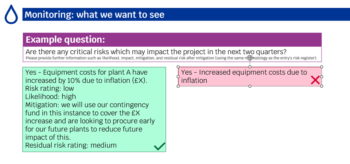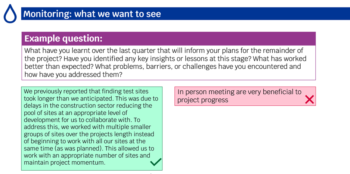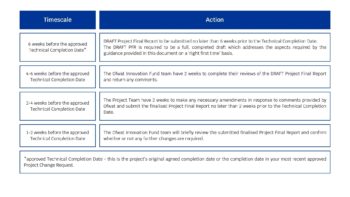Monday 13 January 2025
Monday 12 January 2026
Monday 11 January 2027
Monday 10 January 2028

Everything that you need to know if you are a winner of the Water Breakthrough and Innovation in Water Challenges. This page will give you a clear understanding of what to expect from the Fund’s legal, financial and monitoring requirements, as well as communication activities for all winning projects.
Table of contents:
In this section you will find all information about the Award payment, terms and conditions from all Water Breakthrough Challenge Competitions and the standard template for the Winners Agreement.
The payment of any funds awarded through the Challenge shall be settled through the mechanism agreed by the Water Companies. Neither Nesta, Ofwat nor any of their respective partners in the Challenge shall have any responsibility or liability to anyone, however, arising for the non-payment or delay in payment of any funds awarded through the Challenge.
For Breakthrough 5, the winner’s agreement is based on the standard template available: Catalyst template and Transform template. Please note this template is being provided for information purposes only at this time and may be subject to changes.
For Breakthrough 1, 2, 3 and 4 and the Innovation in Water Challenge it is likely that your winner’s agreement is similar to this template. However, please refer back to your actual agreement for any contractual matters.
In this section, you can find all of the monitoring principles underpinning monitoring activities, information about the Monitoring Officers, as well as finding how to report a project change and the timeline for when to submit your baseline and bi-annual reports.
Through monitoring we aim to:
At various stages, the monitoring process is designed to capture:
Inputs – The resources required to achieve the project objectives (this includes programme, expenditure and costs, risks, including any approvals and consents required and project partners).
Outputs – The direct result of the activity, e.g., technological progress, IP developed, or increased knowledge including lessons learnt. Outputs are definable things which the project produces through doing the work and may be wider than the original expectation (i.e. a direct consequence of the project). The outputs will support the immediate outcomes and longer-term impact.
Outcomes – The changes or benefits that result, generally to the direct beneficiaries of the programme, during and at the completion of the project e.g., benefits to the customers, society or environment from the innovation development. These will be different for each project and will have initially been defined as SMART objectives in the original entry.
Impact – The wider sectoral and longer-term changes that are anticipated to result from the project, either directly or indirectly. These will be different for each project and will likely draw on the impacts included in the original entry. The Outputs from any project should result in direct and immediate Outcomes, but it is also likely that in many cases the Outcomes from multiple projects will act together to achieve the intended / necessary Impact across the sector.
Annual – monitoring questions asked on an annual basis reflecting the project’s position at the end of the financial year (the responses to these questions are reported in July of any given year).
Winning projects will be asked to define and confirm their SMART objectives:
Specific – Be specific about what you are aiming to achieve and how
Measurable – Be clear about what you will measure to assess whether your objective has been achieved
Achievable – Ensure that your outcomes are realistically achievable
Relevant – Make sure your outcomes are aligned to the bigger picture and the long-term impact you want your project to have
Time-bound – Set a date for when you can expect to achieve your outcome
Since October 2024, we have introduced the role of Monitoring Officers into the monitoring process, in order to:
The Monitoring Officer groups are as below, and every project has been assigned a Monitoring Officer (except where the project was due to complete shortly):
The responsibility of the Monitoring Officers are as follows:
The following diagram shows the different types of reports each project will be required to submit over the project’s lifecycle, and the frequency of reporting to be expected.

The baseline report is an opportunity to update and confirm the project’s intended outcomes and programme, any additional risks and opportunities, spend profile, partners list and the project’s expected completion date.
This is one-off report that should be submitted when your projected has started. For the purposes of monitoring, we define your project having started as follows:
Please see the template for the Breakthrough 4 Baseline Report here.
We understand that it can often take some months for Collaboration Agreements to be signed and projects to get started. Therefore the Baseline Report for Breakthrough 5 projects should be submitted no later than 31 December 2025. Should you need an extension to this timeline, then please get in touch with us.

Bi-annual reports are focused on understanding the progress of the entries, any risks and issues and collecting key lessons learnt.
If we consider your project to be more high risk, the Monitoring Team may increase your monitoring reporting from a bi-annual to a quarterly basis which they will communicate with you.
Please see the current Breakthrough Monitoring Form template here.
See some guidance below about examples of information to include in your bi-annual report:



One-to-one virtual meetings are held with the monitoring team, chaired by your project’s Monitoring Officer, to discuss progress, with a focus on any key points or challenges highlighted in the bi-annual or quarterly report.
This is an additional section to the quarterly report, focused on reporting progress over the previous year and updating the delivery programme (these questions will be asked on the Monitoring form in the July or October quarter depending on your monitoring frequency).

This report will be required of all projects at the end of the project and will focus on reflecting on the success of the project and any lessons learnt.
It is Ofwat/ the delivery team’s chance to fully understand the project’s outputs, outcomes and impacts at the project completion.
Your final report (and any IPR) will be hosted on the Ofwat Innovation Fund website and so needs to be written in a manner that doesn’t assume a lot of background knowledge.

Please see the timeline for the draft final report below:

Please find the Project Final Report template (including guidance) here.
See this best practice example from Anglian Water’s The World’s First Ecological Digital Twin project Final Report, which provides a good level of detail and insights of the project’s outputs, outcomes and lessons learned.
Projects will be asked to take part in a semi-structured interview and complete a survey post-project completion. We seek to understand the outcomes the project has developed and understand any further long-term benefits. This is part of the overall assessment of the impact of the Fund and how it’s working to achieve its intended impacts as set out in the Fund’s Theory of Change. This will happen within 12 months of the project’s completion.

Projects are expected to highlight any changes to their project. Please find below the project change request template which you should complete and send to [email protected] for Ofwat’s approval.
Changes that need to be reported as soon as possible via the Project Change Request form, and require approval include:
Changes that need to be reported as soon as possible via email:
The Monitoring Team will reach out to inform you when your monitoring report is due. All projects are required to report on a bi-annual basis, unless identified as higher risk—in which case, quarterly reporting will be required.
Monitoring reports are due January, April, July, October depending on your project’s monitoring frequency.
Monitoring reports are due by the second Monday of the quarter you are reporting in e.g. Monday 13 January 2025, Monday 14 April 2025, Monday 14 July 2025 and Monday 13 October 2025.
Monitoring calls will be arranged for projects that have submitted a monitoring report during the quarter. These meetings will be chaired by your Monitoring Officer, who will reach out to you to introduce themselves ahead of the meeting.
The timing of the monitoring meetings is dependent on the competition stream and the individual project’s risk profile, as well as the availability of the team.
Project check-in calls will also be arranged during quarters when a monitoring report is not required. These 30-minute meetings, chaired by your Monitoring Officer, provide an opportunity for you to share a verbal update on your project’s progress. They also offer a space for open discussion around risks, issues, opportunities, and lessons learned
The Monitoring Team will reach out to projects to arrange a suitable time for monitoring meetings.
Please see the list below for which projects are reporting in each quarter of 2025. This may be subject to change if a project is deemed to be high-risk by the Monitoring Team and asked to move to quarterly monitoring. This list will be updated on an annual basis.
Breakthrough 1:
Breakthrough 2: Catalyst
Breakthrough 2: Transform
Breakthrough 3: Catalyst
Breakthrough 3: Transform
Breakthrough 1
Breakthrough 2: Catalyst
Breakthrough 2: Transform
Breakthrough 3: Catalyst
Breakthrough 3: Transform
Breakthrough 4: Catalyst
Breakthrough 4: Transform
Breakthrough 1
Breakthrough 2: Catalyst
Breakthrough 2: Transform
Breakthrough 3: Catalyst
Breakthrough 3: Transform
Breakthrough 4: Catalyst
Breakthrough 4: Transform
Breakthrough 1
Breakthrough 2: Catalyst
Breakthrough 2: Transform
Breakthrough 3: Catalyst
Breakthrough 4: Catalyst
Breakthrough 4: Transform
Do you have any upcoming project milestones or outputs that you’d like to amplify via external communications? Our Communications and Engagement team are here to support your comms activities and pitch your story to trade and national media. You can let us know about these milestones or activities in a number of different ways: • Through the bi-annual monitoring form in the question about upcoming events, talks, public engagements etc. • If your next bi-annual monitoring submission is several months away, use the Ad-hoc Comms Form below to let us know about any comms activities you’d like us to promote, share or support with • Email us at [email protected]
Twitter handles
@Ofwat
@Challenge_Works
@ArupUK
@IsleUtilities
LinkedIn handles
ofwat
challenge-works
arup
isle-utilities
Visual Assets
Water Breakthrough Challenge logo
Ofwat Innovation Fund logo
Hashtags
#WaterBreakthroughChallenge5
#WaterBreakthroughChallenge4
#WaterBreakthroughChallenge3
#WaterBrightIdea
#WaterBreakthroughChallenge2
Information on past and upcoming events can be found on our Events page.
If your project is speaking at a conference or holding your own events, please do share with us to add to the ‘Upcoming Events from funded projects’ section of the Events page, which we update regularly.
Share with us via your monitoring form, the Ad-Hoc Comms Form or by email, as above.
Please get in touch with [email protected] in the first instance and we will connect you with the PR agency for the Fund, Seven Consultancy.
Breakthrough 2 Transform – General Communications Pack
Breakthrough 3 – General Communications Pack
Breakthrough 4 – Comms pack for winners
Breakthrough 5 – Comms pack for winners
Explore how the sharing learning and IPR from your project can enable us all to meet the aims of the Fund.
Sharing project learning is one of the most important aspects of the Ofwat Innovation Fund as we want to increase innovation awareness and knowledge sharing amongst water companies and the sector. Moreover, the Clause 7 of the Winner’s Agreement covers reporting requirements.
You shall share all of your knowledge and learnings arising from your Project with the Water Companies (which includes New Appointments and Variations (NAVs)), including (without limitation) at the Challenge events, and permit them to use such knowledge and learning unconditionally.
It’s crucial for projects to be sharing learning both during the lifetime of the project as well as part of the final report process, as outlined in the Monitoring section above. The sections below detail how these different types of learning will be further disseminated to the sector.
As part of your bi-annual (or quarterly if required) monitoring submission, the monitoring form includes a number of questions around ‘lessons learned’ from the project to share with the sector:
These are then disseminated with the sector in a number of ways:
If your next bi-annual monitoring submission is several months away, use the Ad-hoc Comms Form to let us know about any comms activities you’d like us to promote, share or support with.
Once your project has been completed, we will update your project’s winner’s page using the Executive Summary prepared in your final report. We will also be asking for the resources that have been created by the project, along with information on who to contact to be able to use your IPR. See some examples here:
This update on the page will serve as a legacy for your project, and also a way for people interested to be able to access your learnings and the IPR from the project.
Breakthrough 5 Winners’ Onboarding Slide Deck (PDF, 3.2MB)
Breakthrough 5 Recording (Vimeo)
Breakthrough 5 Transcript (PDF, 0.1 Mb)